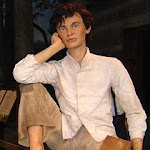This was a big day in Lincoln news. Plenty of other great scribes penned Lincoln stories today with all kinds of interesting news. Let me direct you to the top four in my book.
First Lady doesn’t let Kentucky downI was so excited last February 12 when the Abraham Bicentennial celebration was to officially begin at Lincoln’s birthplace in Kentucky. It did get off to a start that day, in spite of a snow storm moving into the area.
Lincoln scholar Harold Holzer and actor Sam Waterston, who portrays the Cooper Union Lincoln, were there to kick things off. You can watch an
interview of the two from that day on C-SPAN’s Lincoln Bicentennial website. Unfortunately, First Lady Laura Bush couldn’t make it then because the blizzard conditions got too severe.
She kept her commitment to the bicentennial, though, and today, a little more than eight months later, much to the delight of an eight-year-old who got to introduce her, she was there to kick off the
"Give a Lincoln For Lincoln" fundraising campaign for six key Lincoln sites. Thank you, Mrs. Bush.
Be sure to read about her trip to Hodgenville in Bruce Schreiner’s Associated Press
article, as featured in the Chicago Tribune.
Matthew Pinsker cautions using Lincoln’s team as modelIn my blog and in person, I've stayed away from the whole Lincoln-Obama thing. I'm not a politician. Until this fall, when I started the Lincoln class at Heartland College, my knowledge was of the popular Lincoln, the mythological Lincoln and Lincoln in the literature of Illinois. I had a fairly good grasp of them, but his legal career, his political career, his presidency - those where all overwhelming and foreign to me.
Thanks to the class, my professor, Dr. Scott Rager, David Herbert Donald's book,
Lincoln, which we’re using as a text, the scholarly events I'm attending and the independent research I'm doing, those aspects of Lincoln aren’t quite so foreign anymore. Yet still, I leave comments on Barack Obama, Lincoln and politics to those who are more qualified than I am. I know I have miles to go before I'm an authority on those subjects.
I've read some of the Team of Rivals comparisons, but not yet read the book. Yet, as a Lincoln blogger, I’d be remiss if I didn’t draw your attention – and President-Elect Obama’s - to an
opinion column by Lincoln scholar Matthew Pinsker today in the Los Angeles Times.
Pinsker reminds us that some of the lessons to be learned from Lincoln’s team were pretty tough ones. And, as I would expect from an accomplished scholar like Dr. Donald’s protégé, he uses diary quotes from Lincoln’s day with which the common reader - and likely Obama - may not be familiar, to substantiate his opinion. May the column serve as food for thought for our president-elect and his advisors.
Ford’s Theatre awarded honorsFirst Lady Laura Bush wasn’t the only one honoring Lincoln this week.
Her husband, President George W. Bush, named the
Ford's Theatre Society a 2008 National Medal of Arts recipient. The award was presented in a White House ceremony yesterday. The Ford’s Theatre, where Lincoln was shot, is one of the sites to be helped by the “Give a Lincoln for Lincoln” campaign.
And, at the
Lincoln Forum in Gettysburg, the Volk Lincoln Honor was also awarded to the Ford's Theatre yesterday. This award honors the contributions the theatre makes to the Lincoln legacy. Read more about the theatre’s honors in Adam Hetrick’s
Playbill article.
Springfield sites gussy up for companyBack here in Illinois, we’re making news, too. Several of our Springfield Lincoln sites are getting all fancied up for Lincoln’s upcoming birthday. Read about the redecorating at the
Lincoln home and at the nearby
James Morse house. Thanks to two of our great State Journal-Register journalists, Bruce Rushton and Mike Kienzler, for sharing these stories.
Mike is also a blogger. Check out his cool
ALO blog, and don’t forget to add it to your list of “must click” Lincoln sites.
Lincoln’s Home is also a “Give a Lincoln for Lincoln” benefactor.
© Copyright 2008 Ann Tracy Mueller. All rights reserved.







